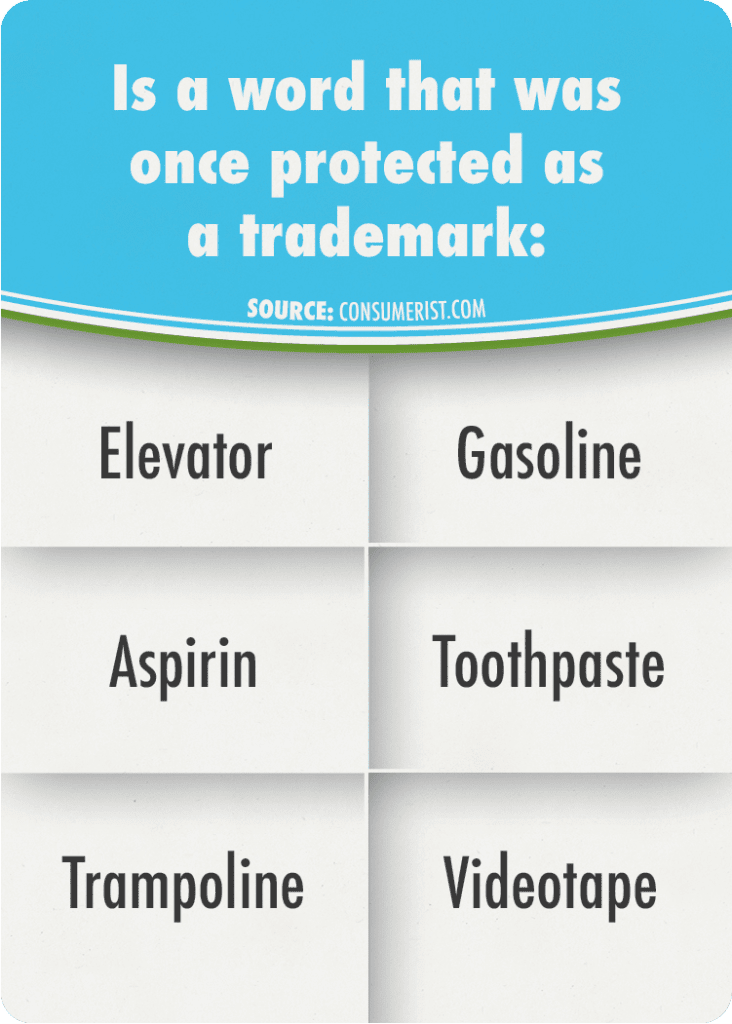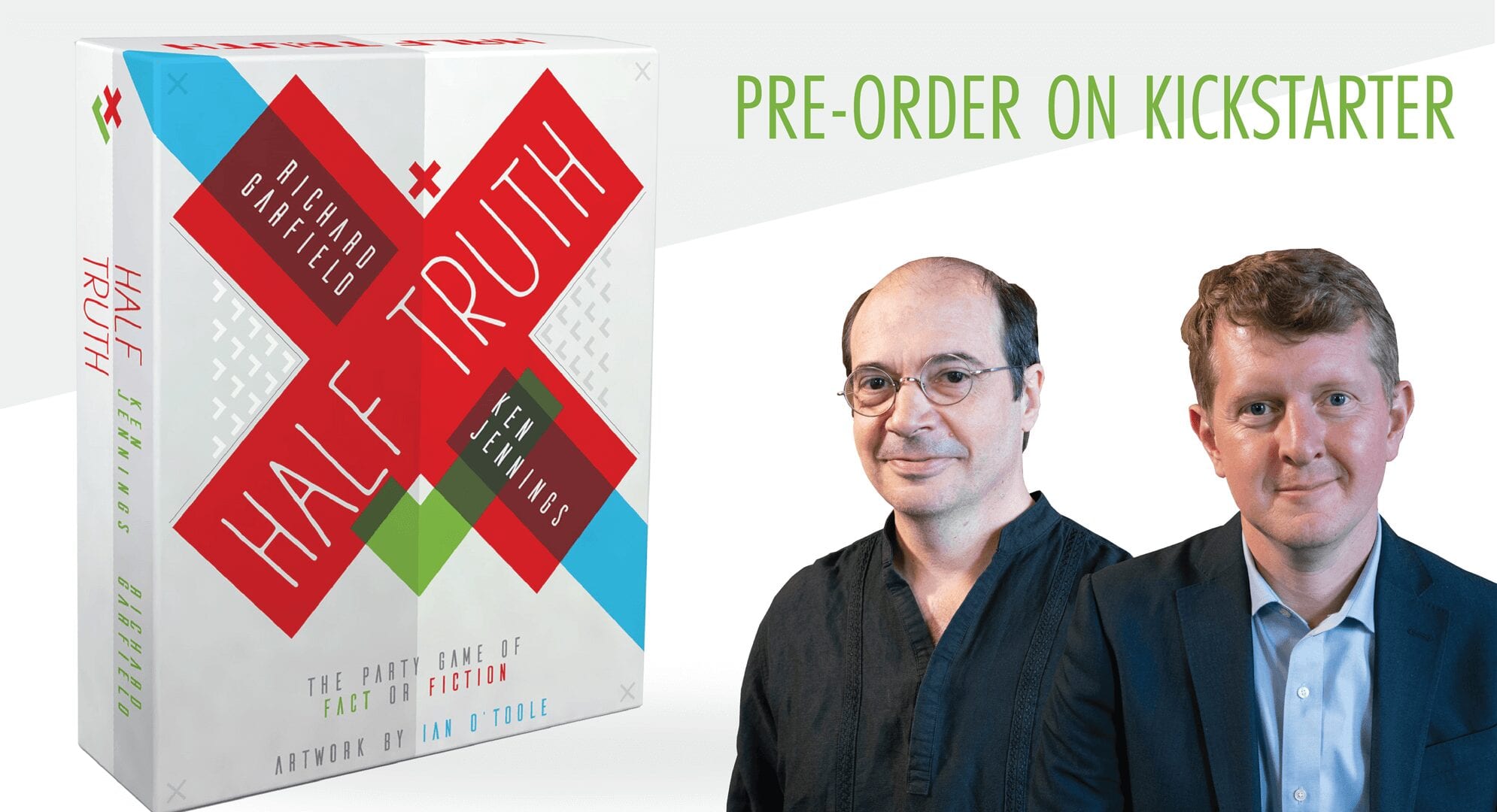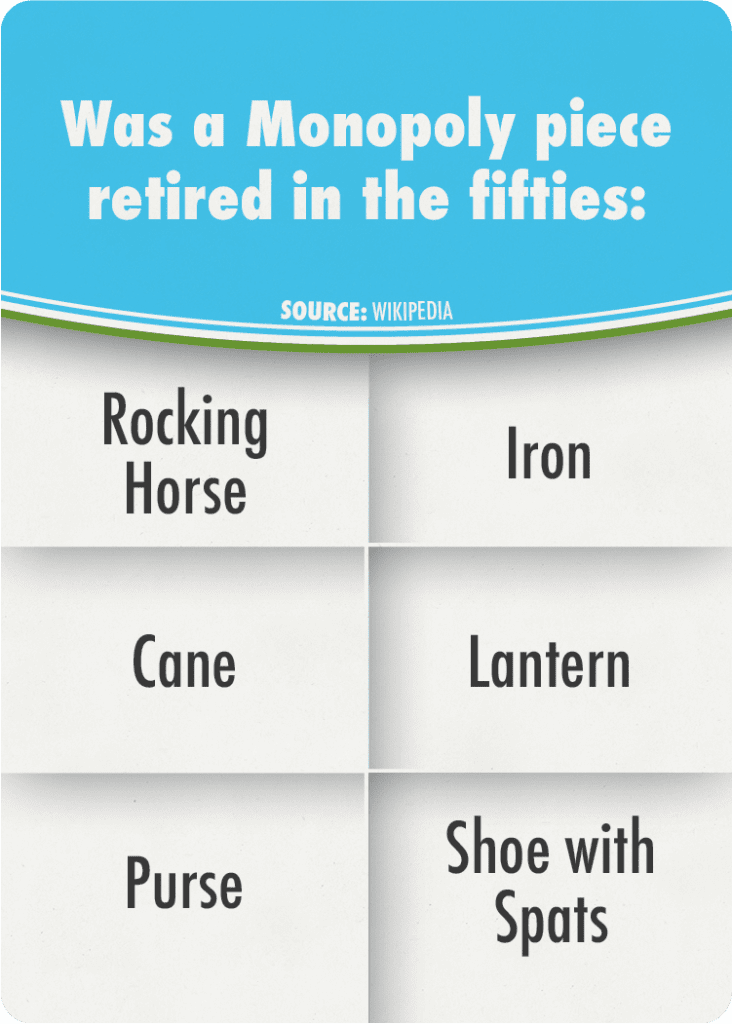INTERVIEW: Richard Garfield and Ken Jennings Talk New Trivia Game Half Truth
In recent years, crowdfunding has become more popular than ever, taking projects directly to the fans for financial support. The latest benefactor of this new model is the trivia card game Half Truth. I had the privilege of speaking with the creators – Magic: The Gathering’s Richard Garfield and Jeopardy! champion Ken Jennings, about this exciting new game.

What was the genesis of this project?
Richard Garfield: The project started about ten years ago when I read Ken’s excellent book, Brainiac. While reading it, I realized I really hadn’t fully appreciated what trivia and trivia style games had to offer. What he had presented there was something much more egalitarian and playful and fun than I thought trivia was, which I had viewed more as a black and white “Do you this actor, or don’t you know this actor?” kind of thing. So after reading this, I decided to try to make a game that bought those characteristics out. A couple years later, I contacted Ken, asked him if he’d like to be a part of the project, and that’s how it started.
Ken Jennings: Let me tell you, that’s a very flattering phone call to get, when Richard Garfield of all people tracks you down to say, “I read your book, I like your book, and I wanna do a game about it.” It really is like Samuel L. Jackson’s Nick Fury saying, “Ken, we need you to join the board game Avengers.” [laughs]
What did you learn from each other on Half Truth?
K: I learned from Richard, a lot of stuff about board game design and aesthetics I never even thought about. The level of detail that goes into every decision, of rules that goes into a board game, and the laborious play testing that has to happen. As a casual tabletop gaming fan, I had never thought about all the considerations that are going on inside a designer’s brain. It’s kinda like, if you think of trivia as an art form, this made me think of a board game designer as an artist in a way I had never done.
R: Working with Ken – I learned a lot of this just from Brainiac – but then furthering the relationship through the game, learned about how to put together a trivia question in such a way that it’s almost like a little game you play with your audience, that they’re trying to outguess you, the question maker.
How does Half Truth work and how is it different from other party games?
R: The game works like a traditional party game, in that you sit around, do some stuff, and at the end of the 45 minutes or so there’s a winner, you had a great time, and can’t wait to play it again. The particular questions in this trivia game have a unique structure. They all have six answers given. Three of them are correct; three of them are incorrect, hence the name, Half Truth. Players are tasked with finding at least one of the correct answers. They can try to gamble on whether they can select two or three of the correct answers for points, but really, they’re risking everything, and most of the work comes from getting just one correct.
How did this differ from your work on Magic: The Gathering and the Star Wars Trading Card Game?
R: I’m an enthusiast of the entire genre of games. I like to play both board games, traditional games, card games. And they all have some family structures, but at the same time, they’re all very different. This, in particular, was very different from Magic and other massively modular games because there, you’re designing a system in which there’s are many many different pieces that you could put together and make a satisfying game experience. Here, as I said, there’s a basic framework to the game which I think supports it very well, but then each card is sort of a tiny standalone game that the players are playing, which is this trivia game.
Mr. Jennings, what did you take from your time on Jeopardy! that you bought with you to the development of this game?
K: I feel like, as a lifetime Jeopardy! viewer, it’s really informed my sense of how a good quiz game should work, the kind of wheels that it should turn in people’s heads. I really like how Jeopardy! clues are really complicated; they’re little puzzles to solve, there are clues and hints and misdirections, red herrings, silly little puns or jokes. Each question is funny, but it’s also kind of a riddle to solve, so I kind of like that in a card game, where you’re not just banging your head on the table trying to remember the capital of Mississippi or something, or even worse, waiting for somebody else at the table to try and remember the capital of Mississippi. In Half Truth, everyone’s playing at once and there’s six answers in front of you. You’re just trying to outwit the cards; you’re trying to figure out, “Someone’s blinded me three times on this card; can I figure out what it is?” And I think the result of that is, it’s a trivia game for everybody, you know? It’s not the kind of trivia game where you feel dumb all the time for all the stuff you don’t know; it’s the kind of game where you really surprise yourself with how well you do and how often you can outsmart the card.
Would you say it’d be almost a confidence-builder for those who aren’t used to playing these types of games?
K: Somebody asked me that today, and I think it’s a really good point. I hear this all the time; somebody will tell me how much they like trivia, or their husband likes trivia, and I’ll tell them “Oh, you should go on Jeopardy!” and people are like, “Oh, no, I could never do that.” People are very hard on themselves. They don’t give themselves credit for how much they know. I think this’ll really surprise people in how well they do and how there’s stuff in their brain they haven’t used in a long time, but it’s really gonna pay off in the next forty-five minutes. [laughs]
What did you learn from this experience that you will bring to your next project?
K: You know, one thing I’ve been thinking about lately is that we are putting out the game of Kickstarter, trying to build a community for the game before the game is even on shelves. I really think that’s a powerful thing. I also have a podcast; we just switched over from a corporate parent to doing it independently via a donation/Patreon model, and we found out that the show’s more lucrative trying to ask people what they’re willing to pay for than it is selling ad space on it. And I love that idea that fandom and fan communities might be stronger than consumer and capitalism; I hope a community forms around it and finds the game special for the same reasons we do.
What was it about crowdfunding – Kickstarter, in particular – that made it the right choice for Half Truth?
R: This was less a matter of choosing Kickstarter as a platform as choosing Studio 71 to crowdfund it, and that’s what they recommended we work with. They have a lot of experience in managing campaigns, figuring out what’s needed as far as community building and stretch goals and all the other elements of these campaigns. Since usually I work with more traditional paper game publishers, I don’t know, so I’m following their lead.
Given your traditional experience, and now having the Kickstarter/crowdfunding experience, is this something you’d like to continue to explore?
R: I think they both have their place. I think it’ll depend on the game. There are many games I do where building a community in this way ahead of time is not as important for how the game is developed. But for a trivia game which has to appeal… the breadth of trivia we’re hoping is big enough that it really appeals to a lot of people. That’s the bottleneck in that process, is the fact that there’s only a few of us making those questions, so incorporating the [Kickstarter] community in giving us feedback on what works for them, what doesn’t, and what they want to see more of, will be very valuable for this game, in particular.
How did the creation of the questions work with the rest of the team?
K: There’s a lot of strength in having trivia come from multiple writers. I had people come up with tricks for this game that hadn’t occurred to me before as far as structuring the questions, and then you get away from the biases of any particular person. You know, if I don’t know anything about country music, there’d be no country music in the set, so in that case we had a small team of people contributing questions as they occurred to them. And then I kind of worked as an editor, whittling the ball into shape and hopefully accentuating the good ideas and taking off some of the rough edges. It’s a box of 500 cards that are kind of what I think are the best trivia games have to offer. I hope everyone has fun with it.
What was it like working with game artist Ian O’Toole?
R: He’s very experienced with game graphics, and it’s very important that they not only look good, but also don’t clash or interfere with the game. He’s been offering us lots of different options, between different looks and approaches that we could make on different graphic elements of the game. It’s been terrific to have an experienced set of options to choose between because they all look great but some of them are better and will speak to us a little bit better for what this game is about.
Are there going to be developmental materials released with the game?
K: That’s a pretty good idea; hadn’t thought about that.
R: I don’t think we talked about that but it seems like something we’d be open to. I’ll think about what we’ve got that could document the history of the game.
What are you both working on next?
K: I’m a full-time writer now. I just put out my new book, Planet Funny, which is about the history of comedy. I’m already late with the next book, which is going to be Travel Guide to the Afterlife. Twice a week I do my Omnibus! podcast with my friend John Roddick, and I’m @kenjennings on Twitter.
R: I’m working on a bunch of games all the time. Most of them will never see the light of day because I just test them with my friends and then move on. I’m spending my time right now working on Half Truth and Keyforge. Keyforge was a game I released last year through Fantasy Flight. It’s the first unique death game; everybody who plays it gets their own death, with its own unique name and context.
Mr. Garfield, are you still involved in Magic: The Gathering in any capacity?
R: I go in occasionally and work on an expansion every few years. It’s been a few years, so I’ll probably go back and work on an expansion within the next year or two. But I haven’t been involved for a few years.
Mr. Jennings, I have to ask; are we going to see you back on Jeopardy! anytime soon?
K: You know, they do drag me back on every few years. It’s like the Mafia; you can’t quite get out. I was just on last year for a team tournament, so ordinarily I’d say it’s gonna be a while before the phone rings again. But they had a guy on last year who was really pushing the envelope on Jeopardy! winnings and came close to breaking a lot of my records on the show, and I know a lot of people are wanting to see some kind of face-off between me and James, so I would not be surprised if that happened sooner or later. I hope sooner because I’m in my forties now and I’m forgetting everything I used to know, so they need to do it quick before I’m fully senile.
R: Didn’t they make you play against Google or something?
K: IBM had a supercomputer designed to beat me at Jeopardy!, which – spoiler – it did.
We would like to thank Mr. Jennings and Mr. Garfield for their time and wish them the best of the luck on the Kickstarter for Half Truth, which is now live!








